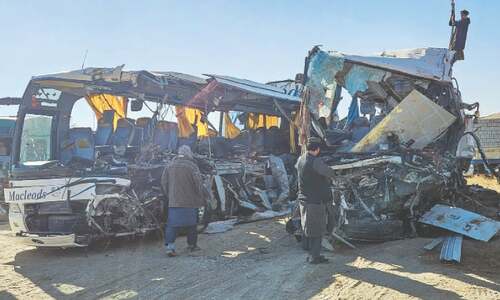KATHMANDU: Nepal has been hit by fresh killings, officials said on Wednesday, on the eve of a tense and uncertain vote on the Himalayan nation’s future following a peace deal with Maoist rebels.
Six members of the Maoists, who are campaigning for the abolition of the monarchy, were shot dead by police late Tuesday in the western Nepal after clashing with supporters of a rival party, local officials said.
In other violence, an election candidate was assassinated in the west of the country also on Tuesday, while the capital and the south have been rocked by small bombings.
The polls on Thursday will mark the climax of a peace process that ended the Maoists’ decade-long war that left at least 13,000 dead.
The elections, for a body that will rewrite the constitution, are expected to lead to the ouster of unpopular King Gyanendra and the abolition of the 240-year-old monarchy.
But even though the Maoists have put their hardened jungle and mountain fighters into United Nations-monitored camps and signed up for peace, they have been under fire for intimidation of voters.
Likewise, King Gyanendra and his die-hard supporters in the army stand accused of orchestrating ethnic unrest and the bombings, as well as plotting a coup.
Maoist leader Prachanda, whose nom-de-guerre means “the fierce one,” has warned the rotund, dour-faced monarch of “a trial and strong punishment” if he does not go quietly — setting the stage for what could be an ugly showdown.
The leftists also want to see the back of Crown Prince Paras, loathed for his playboy lifestyle in one of the world’s poorest countries.
In principle, the new Constituent Assembly will boot out Gyanendra, who took the throne in 2001 after most of the royals were shot dead by a drunken, stoned and suicidal prince.
Some mainstream politicians competing against the Maoists, however, are sympathetic to the idea of keeping some form of symbolic monarch so as to guard the neutrality of a country wedged between Asian giants India and China.
With no single party likely to win a majority, the post-vote period could herald more unrest, the International Crisis Group (ICG) has warned.
“Nepal has many possible flashpoints, not least that the two armies that fought the war remain intact, politically uncompromising and combat-ready,” the Brussels-based think tank said, referring to the Maoists and the pro-royal national army.
“The post-poll period will likely be difficult and dangerous. The behaviour of powerful losers will shape the immediate aftermath. Some, in particular the Maoists, may even be tempted to reject the entire election,” the ICG said.
Campaigning has been marred by reports of intimidation by Maoists loyalists, many of whom have failed to adapt to civil life after years spent ambushing and bombing their way to the capital.
This has left the UN trying to reassure the Nepalese people, for whom democracy has been an all-too rare event given the years of turbulence on the roof of the world, that “no-one will know who they are voting for.” The south of country has been hit by a wave of ethnic unrest and a string of bombings that the Maoists say have been orchestrated by the king and Hindu fundamentalists who still view Gyanendra as a god.
The polls will be the most watched in Nepal’s history — with hundreds of international observers in the country. Security has also been stepped up, with precautions including a ban on alcohol sales.
Nepal’s main parties, the centrist Nepali Congress and the centre-left Communist Party of Nepal (Unified Marxist-Leninist), are expected to grab most seats.
Analysts say the big question is whether the poll outcome gives the Maoists — still listed by the United States as a foreign “terrorist” organisation — enough political clout in a new 601-seat assembly to motivate them to stick within the democratic system.
“If they try to stop us from implementing revolutionary change in the society, we will have to resist that,” the Maoists’ number-two Baburam Bhattarai said on Monday.—AFP














































Dear visitor, the comments section is undergoing an overhaul and will return soon.